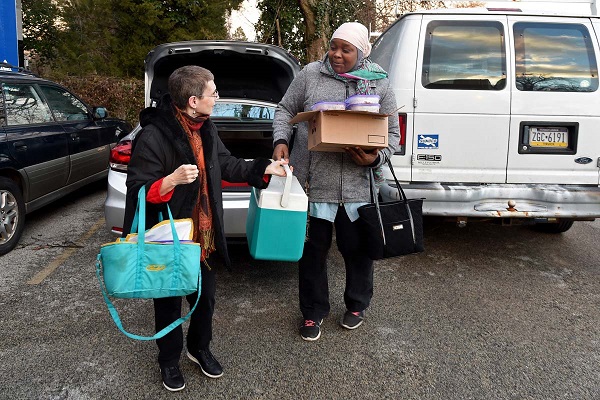PHILADELPHIA – At a time of religious prejudice, a group of Philadelphia Muslim and Jewish women are cooking together to feed the hungry and poor in their community, as part of a movement to bring together groups of Muslim and Jewish women around the country.
“The idea is that you can’t hate what you love,” Meredith Barber, a Penn Valley psychologist who is the Jewish cochairwoman of the Philadelphia chapter of Sisterhood of Salaam Shalom movement, told the Philadelphia Inquirer on Thursday, February 23.
“The idea is about Jewish women and Muslim women getting to know one another and becoming friends and changing the world that way, through relationships.”
One of 14 chapters of the movement, which started two years ago, Barber’s includes 14 members, who participate in monthly meetings.
The women also meet quarterly for marathon cooking sessions that produce dozens of kosher and halal meals to serve at soup kitchens and to stock the freezer at the Philadelphia Interfaith Hospitality Network.
“After we were meeting for a year or so, the women said, ‘We’d like to do something together,’ ” Barber said.
“We had a discussion about what we wanted to do, and we wanted to feed homeless people and we wanted to cook together.”
On a recent Sunday afternoon, five of them gathered in Barber’s kitchen to make six large pans of kosher vegetarian lasagna.
Teresa Hadjali, 52, a principal at an Islamic school, she said the sisterhood is a place where she finds acceptance and solidarity.
“It is, first of all, a very healing and encouraging support group.”

Sandy Choukroun (left) and Fatmata Sillah (right) with the Sisterhood of Salaam Shalom, deliver frozen kosher and halal meals at the Philadelphia Interfaith Hospitality Network in Mt. Airy February 15, 2017.
Common Ground
Sally Selim, 43, of Malvern, the chapter’s Muslim co-chairwoman, said that, in most settings, “we tend to focus more on what is different instead of what we have in common.” In the sisterhood, the opposite is true.
She recalled the relief of attending her first meeting following the presidential election in November.
“I felt I could talk openly. All the fears and anxiety and anger and disappointment, I felt I could finally get that out in the open,” she said.
Kathy Roberts, 52, of Gulph Mills, agreed: “When you get down about politics, you get together with these women and you feel like there is still humanity left.”
Rachel Falkove, of the Philadelphia Interfaith Hospitality Network, said the meals are making a small but vital difference.
“We get a lot of people walking in who are hungry,” she said. “We have families who run out of food stamps and need something to feed their kids. We get working poor coming in who don’t have food stamps, but they’re just not making it. And not everyone has cooking ability in their homes: They may not have utilities. They may not have a working stove. They may not have a refrigerator.”
Sillah said she hopes these small gestures can result in a cumulative impact.
“I think at this time we needed something like this,” she said. “Women are the ones that make things happen. We might not be at the forefront, but we make things happen.”
“We get a lot of people walking in who are hungry,” she said.
“We have families who run out of food stamps and need something to feed their kids. We get working poor coming in who don’t have food stamps, but they’re just not making it. And not everyone has cooking ability in their homes: They may not have utilities. They may not have a working stove. They may not have a refrigerator.”
Sillah said she hopes these small gestures can result in a cumulative impact.
“I think at this time we needed something like this,” she said. “Women are the ones that make things happen. We might not be at the forefront, but we make things happen.”